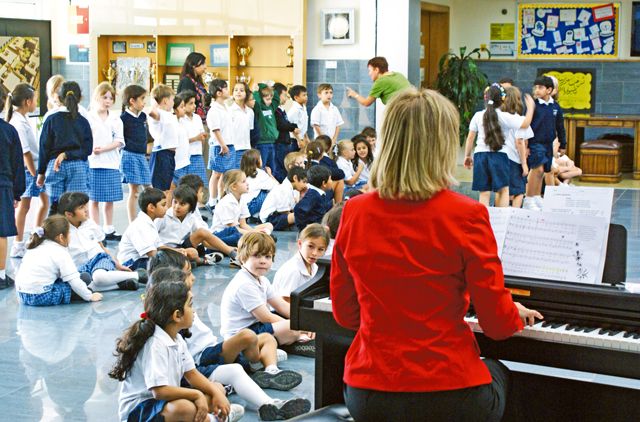There is no single school curriculum that will suit every child and no school is right for all children. It is a fact of life familiar to every parent when choosing a school, probably more so in the UAE with at least 13 curricula and several hybrids on offer catering for 190 nationalities.
A curriculum is both a method of teaching and a marketing tool. Some parents are clear about what their children should get from their school: entry into the best of further education their culture or home country can offer. If finances allow, their choices can be simple.
Others follow a word-of-mouth recommendation from friends or colleagues. Not many understand the finer points of a curriculum and many of us are hopelessly out of date about teaching methods.
In this mix is the International Baccalaureate (IB) curriculum, offered at various levels in 15 Dubai schools, including six IB-only schools (a total of more than 10,000 pupils), three in Abu Dhabi, one in Ras Al Khaimah, and newcomers in Sharjah and Ajman beginning this academic year.
Ideal for the expat child?
At face value, IB would seem ideal for the mobile UAE expat child. It was developed after the Second World War for children whose parents move with their jobs so that the child could have an international qualification for entry into university wherever he/she had been taught.
However, in the UAE all nationalities, including Emiratis, are registering their children for IB that is built on accountability, personal development, curiosity, community service and critical thinking.
Karin Londt, Managing Director, Back2Basix Educational Solutions, says: "Right now, IB is the holy grail. If policymakers choose to support it, then it will take off across the UAE. There is competition to bring curricula here, from Finland and Singapore, for example. The UAE places great importance on standardised tests and if IB schools perform well in those, then it will spread. Education has to give value for money, so if a child can transfer easily to a school elsewhere in the world, and his qualifications are recognised by universities across the world, parents can see the value of the curriculum."
A spokesman for the policymaker Abu Dhabi Education Council (Adec) says: "Adec does not support IB. We are neutral when it comes to the choice of curriculum in the private sector."
Margaret Atack, Group Senior Director Education, Gems Education, says: "Gems caters to students from across the globe, so offering IB was to meet the demands of a local and international clientele. As part of our strategic growth we will offer more IB schools alongside English National Curriculum, American Curriculum, CBSE, etc. The IB Diploma has an international currency that prepares students well for tertiary education across the globe."
This is a view echoed by Tim Waley, principal, Uptown Primary School, which is owned by the Taaleem group that runs four IB World Schools in Dubai and one in Abu Dhabi. Waley says IB teaches the skills to learn rather than just the content.
"If you have two boys fighting in the school playground, a teacher will sit them down and get them to evaluate the situation. Nine times out of ten, a child will reach the right conclusion. The development of the child is the critical benefit."
Waley adds: "I am an IB convert. From a teaching perspective, it is highly rigorous and demanding. You have to record your observations, and the process involves a high degree of accountability."
This is a strength that Veronique Davidson values since she moved her children, Thomas and Heather, to Emirates International School in Dubai three years ago, where they are taught the IB curriculum. Davidson says: "The children are not just numbers. When I read their report cards, I know the teachers are writing about my children as individuals... I like the core principles and values that they teach."
A bit expensive
People tend to be evangelical about IB, but it doesn't come cheap. Schools have to invest a lot of money in training their staff (about Dh3,500 per course for each teacher) to teach the curriculum. Taaleem has turned this to its advantage and now gives IB training in Dubai to about 1,000 teachers each year from all over the world.
Around the world — most recently in Australia, the UK, US, Ecuador and Nova Scotia in Canada — governments are incorporating IB into their state school curricula with its emphasis on critical thinking and community service, as well as its long essay component for older pupils.
In the private marketplace of education, parents vote with their feet and their chequebooks. In state schools, other factors come into play. It will be interesting to observe whether IB grows in the UAE.
Will the IB curriculum catch on in the UAE?
A focus on personal development, curiosity, critical thinking and community service has made the globally accepted International Baccalaureate curriculum attractive to parents














